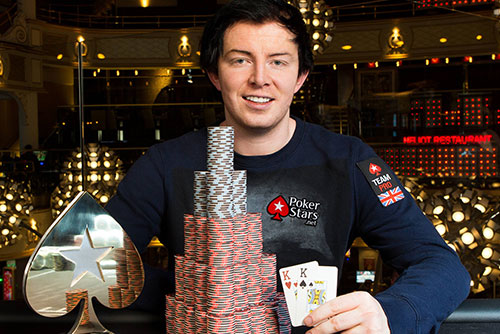Online Poker Report’s Eric Ramsey and partypoker sponsored pro Ike Haxton talked about a wide-range of topics in a recent interview. Among the topics Haxton discussed was his new role with partypoker and the current online poker landscape, including the current trajectories of his new company, partypoker, and his old company, PokerStars.
During the interview there were a couple of comments that really leapt off the page and warrant more discussion.
Is PokerStars saving or reallocating money?
In his lead-in, Ramsey wrote that while partypoker is adding sponsored pros, PokerStars has been cutting them.
“PokerStars’ non-poker owner, The Stars Group, doesn’t appear to have the same budget for long-term deals as the previous owner,” Ramsey wrote, noting that PokerStars’ U.S.-facing roster has been culled in recent years.
The Team PokerStars roster has definitely been downsized, but I’m not sure calling it a budget issue is quite correct.
In an interview with PokerNews, Eric Hollreiser, director of corporate communications for The Stars Group, explained that the shift to celebrity endorsers reduced the companies need for a certain type of sponsored player.
“So we continued to reduce the roster of Pros, while always adjusting the mix of players,” Hollreiser told PokerNews. “We also believed that our ambassadors should not solely be winners and credible/authentic poker players but should live and breathe the game, proactively creating excitement around it and generating multimedia content that reaches multiple audiences.”
PokerStars has simply lost its appetite to spend like a drunken sailor on sponsored players. At the end of the day, the money previously being spent on sponsored pros is by and large being shifted elsewhere, including signing big-name athletes and celebrities, the PokerStars Players Championship, and innovative products like Power Up.
Who’s more prepared for U.S. online poker?
Setting aside what’s happening to the money PokerStars was paying some of its former sponsored pros, Haxton’s view of the future U.S. market was the part of the interview that really caught my eye.
“I mean, I don’t know what Stars’ strategy is,” Haxton said. “But they don’t seem to be, at this point, as invested in being ready for a U.S. launch as they once were or as Party is now.”
This is a weird statement.
First, both companies are already involved in the legal U.S. online poker market in New Jersey, as well as prepping to launch in Pennsylvania.
Second, PokerStars has a very clear U.S. strategy and is well positioned to be a player in legal U.S. markets.
PokerStars has been actively lobbying for online poker legislation in Pennsylvania, New York, California, and Michigan, where it has:
- Spent millions of dollars for several years trying to push online poker legislation across the finish line in several locales;
- Formed partnerships with land-based operators in these jurisdictions; and
- Sent spokespeople and other experts to testify at hearings.
Bottom line: PokerStars is way ahead of every online poker company not named 888 in the legal U.S. market, and is the only company really pushing for future expansion.
To say partypoker is better positioned in the U.S. is to ignore all of the available evidence, including the rosters of sponsored players at each company.
partypoker is catching up, but still way behind
Haxton’s comment seems to stem from the fact that PokerStars has been cutting U.S. players while partypoker has been adding them.
That may be true in recent months, but PokerStars U.S. roster is still way stronger than partypoker’s.
Here’s a look at PokerStars U.S. roster:
- Daniel Negreanu (Canada/U.S.)
- Chris Moneymaker
- Jason Somerville
- Jeff Gross
- Barry Greenstein
- Jamie Staples
- Jennifer Shahade (Ambassador)
- Randy Lew
- Victor Ramdin
Here’s partypoker’s:
- Mike Sexton
- Jason Koon
- Isaac Haxton
And if you think PokerStars is going to sit on its hands and not expand its roster as new states pass legislation, then I have a bridge for sale.
Which PokerStars is better for U.S. players?
The final aspect of the interview I want to discuss is the notion that the ownership change has been entirely to the company’s detriment.
Ramsey wrote:
“PokerStars, once the overwhelming market leader, has earned some distrust from customers in recent years. An ownership change brought about a cutthroat focus on the bottom line and a series of changes to player perks that not everyone loved. It’s the reason Haxton left the site at the start of 2016.”
Ramsey is right. PokerStars shot itself in the foot when it decided to abruptly end the second year of Supernova Elite benefits, and with that as the starting point, subsequent changes have been largely unpopular among a small segment of players.
As clumsily as that was handled, the narrative players like Ike Haxton are putting forth, that Isai Scheinberg was running PokerStars like a non-profit until the greedy corporate raiders named Amaya showed up and ruined everything, is fantasyland.
First, almost every critical change made by current PokerStars’ ownership was set in motion by the previous owners. Ask former employees or any current employee whose tenure spans both owners, they’ll tell you things like adding a casino and sports book can be traced back to the Scheinbergs.
That isn’t the case when it comes to the roster of sponsored players. If the Scheinbergs were still at the helm a lot of players cut loose would have likely been renewed. But that doesn’t make loyalty a good business decision. The new publicly traded PokerStars simply doesn’t have the same sentimental blind spot when it comes to the value of sponsored players, nor can it justify the expense to its investors.
Second, PokerStars would be sitting on the sidelines of the U.S. market.
Everyone wants to look back fondly on the Scheinberg era, but let’s not overlook that an Isai Scheinberg led PokerStars couldn’t get a license in regulated U.S. markets.
Even after Scheinberg was out, New Jersey still gave PokerStars a two-year timeout before approving its license.
The company has also been blackballed in Nevada, with other states considering similar prohibitions stemming from the way the company did business in the U.S. under the Scheinbergs.
Whether you agree with the “bad actor” designation PokerStars has been tagged with or not, the idea that U.S. players would be better off today with the Scheinbergs at the helm is a debatable point.
For one thing, it’s highly unlikely the company could secure a U.S. license while Isai Scheinberg is under indictment by the DoJ. With no license, and no hope for a license, there wouldn’t be a PokerStars NJ and PokerStars would have probably cut way back on its U.S. lobbying spend. Without PokerStars lobbying dollars and education efforts, legislation might not have been passed in Pennsylvania last year.
Isai Scheinberg created a great company, and under his leadership it became a best-in-class business. But if you’re a U.S. player keen on playing at PokerStars, realize it most likely wouldn’t have happened under the Scheinbergs. Not to mention PokerStars would have been offering casino and sports betting just like it does now.
The post Ike Haxton Thinks partypoker Has A Leg Up On PokerStars In The U.S. appeared first on .



